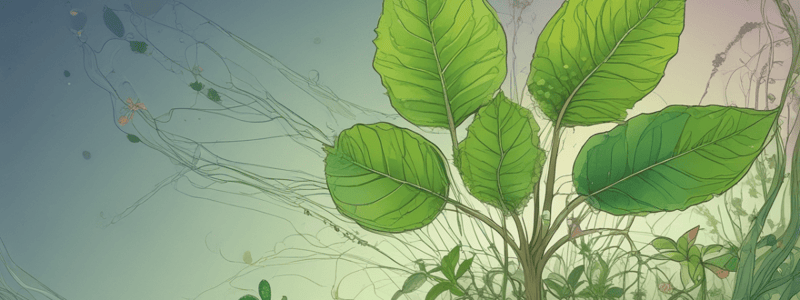Podcast
Questions and Answers
What is the name of the process by which water is constantly lost through the stomata in the leaves by evaporation?
What is the name of the process by which water is constantly lost through the stomata in the leaves by evaporation?
- Nutrient absorption
- Cohesion-tension
- Transpiration (correct)
- Root pressure
What is the function of the Casparian strip in the endodermis cells?
What is the function of the Casparian strip in the endodermis cells?
- To increase the surface area for water uptake
- To transport water from the roots to the leaves
- To regulate the uptake of water and nutrients (correct)
- To facilitate the symbiotic relationships between plants and microorganisms
What is the mechanism by which water enters the root hairs from the soil?
What is the mechanism by which water enters the root hairs from the soil?
- Active transport
- Osmosis (correct)
- Passive transport
- Cohesion-tension
What is the term used to describe the movement of water in the xylem vessels from the roots to the leaves?
What is the term used to describe the movement of water in the xylem vessels from the roots to the leaves?
What is the purpose of the root hairs?
What is the purpose of the root hairs?
What type of relationships between plants and microorganisms can improve the uptake of nutrients from the soil?
What type of relationships between plants and microorganisms can improve the uptake of nutrients from the soil?
What is the main function of xylem tissue in plants?
What is the main function of xylem tissue in plants?
What is the role of chlorophyll in photosynthesis?
What is the role of chlorophyll in photosynthesis?
What is the byproduct of photosynthesis that is excreted by the stomata?
What is the byproduct of photosynthesis that is excreted by the stomata?
Which part of the leaf contains cells packed with chloroplasts?
Which part of the leaf contains cells packed with chloroplasts?
What is the first stage of respiration that occurs in the cytosol of the cell?
What is the first stage of respiration that occurs in the cytosol of the cell?
What is the byproduct of glycolysis that is further broken down in the mitochondria?
What is the byproduct of glycolysis that is further broken down in the mitochondria?
What is the function of the guard cells in the stomata?
What is the function of the guard cells in the stomata?
Where does the majority of photosynthesis occur in the leaf?
Where does the majority of photosynthesis occur in the leaf?
Flashcards are hidden until you start studying
Study Notes
Vascular Tissue
- Vascular tissue is composed of phloem and xylem.
- Xylem transports water and minerals from roots to leaves.
- Phloem transports sugars produced by photosynthesis from leaves to other parts of the plant for storage.
Photosynthesis and Leaf Structure
- Plants are autotrophic, meaning they produce their own food.
- Chlorophyll absorbs light energy to combine hydrogen from water and carbon dioxide to produce glucose and oxygen.
- Excess oxygen is excreted by stomata.
- Palisade layer cells are packed with chloroplasts, carrying out most of photosynthesis.
- Stomata allow for gaseous exchange, with carbon dioxide diffusing in and oxygen and water vapor diffusing out.
- Guard cells control the opening and closing of stomata.
Respiration
- Plant and animal cells obtain energy in the form of ATP through aerobic respiration.
- Glycolysis, the first stage of respiration, occurs in cytosol, producing pyruvic acid and small amount of energy without requiring oxygen.
- In mitochondria, pyruvic acid is broken down into carbon dioxide and water, producing a large amount of ATP.
Water Transport
- Water movement from roots to leaves is caused by root pressure, cohesion-tension, and transpiration.
- Transpiration stream refers to the movement of water in xylem vessels from roots to leaves.
- Root pressure is caused by continuous water movement by osmosis from soil into root hairs.
- Water is lost through stomata by evaporation, drawing water out of xylem vessels to replace lost water.
Nutrient Absorption
- Root hairs increase surface area for water and nutrient uptake from the soil.
- Nutrients are absorbed into root hairs from soil solution by active transport.
- Endodermis cells, embedded in the Casparian strip, regulate uptake of water and nutrients and protect the plant.
- Symbiotic relationships between plants and microorganisms help improve nutrient uptake from the soil.
Studying That Suits You
Use AI to generate personalized quizzes and flashcards to suit your learning preferences.




